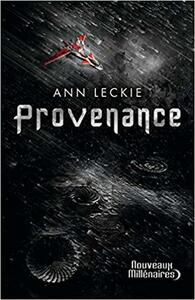You need to sign in or sign up before continuing.
Take a photo of a barcode or cover
Again, why did I hold off reading this book for so long?
I've loved everything I've read by Ann Leckie and this book was no different. Provenance expands the universe that was crafted throughout the main trilogy by focusing on other human civilizations that were referenced before. This book takes place shortly after the conclusion of Breq's storyline in the main trilogy.
This book focuses on Ingray, an adopted child of a powerful political family who is trying to figure out where she fits in the society in which she was raised. She abducts/buys/kidnaps/saves a person she believes to be a child of a rival family who was sent to Compassionate Removal - essentially a societal death sentence without an actual killing- in order to either upend the power structure of her family or the other. What follows is an enjoyable ride that makes you question what you've been told to believe in your own life. What makes something historically important? When does the authenticity stop mattering for vestiges and the meaning behind them take precedence?
These are all questions asked by the novel and this is only the beginning. And those questions may seem weird or minor to you without reading the book but trust me, it makes sense. And we also get a look at the Geck (yay!) as well as spending some time with an annoyed Radchaii Ambassador who moans about subpar tea among other things.
This book, like everything I've read by Ann Leckie, has characters of all genders loving sentients of all genders and sometimes other species.
I've loved everything I've read by Ann Leckie and this book was no different. Provenance expands the universe that was crafted throughout the main trilogy by focusing on other human civilizations that were referenced before. This book takes place shortly after the conclusion of Breq's storyline in the main trilogy.
This book focuses on Ingray, an adopted child of a powerful political family who is trying to figure out where she fits in the society in which she was raised. She abducts/buys/kidnaps/saves a person she believes to be a child of a rival family who was sent to Compassionate Removal - essentially a societal death sentence without an actual killing- in order to either upend the power structure of her family or the other. What follows is an enjoyable ride that makes you question what you've been told to believe in your own life. What makes something historically important? When does the authenticity stop mattering for vestiges and the meaning behind them take precedence?
These are all questions asked by the novel and this is only the beginning. And those questions may seem weird or minor to you without reading the book but trust me, it makes sense. And we also get a look at the Geck (yay!) as well as spending some time with an annoyed Radchaii Ambassador who moans about subpar tea among other things.
This book, like everything I've read by Ann Leckie, has characters of all genders loving sentients of all genders and sometimes other species.
Not as complex or unique as the Radch trilogy, but still entertaining. I didn't enjoy the focus on family politics. I did like Ingray, who wasn't a stereotypical protagonist.
This book was good, but not amazing. I didn't find it immersive the way Ancillary Justice was, but nevertheless I did enjoy reading it.
adventurous
emotional
informative
tense
fast-paced
Plot or Character Driven:
Character
Strong character development:
Yes
Loveable characters:
Yes
Diverse cast of characters:
Yes
Flaws of characters a main focus:
Yes
A bit too much exposition and talking-head episodes of plots within plots for me, but the character building and plot is nonetheless very credible
Set in the same galaxy as Ancillary Mercy, but a completely different world. I wouldn't have realized it if not for the Radch ambassador. Likeable heroine, a story with a lot of unexpected twists and turns, and a bunch of fascinating cultures.
I listened to this on audio, and I'm not sure I'd recommend it. A lot of the accent choices were bizarre, or kind of racist.
I listened to this on audio, and I'm not sure I'd recommend it. A lot of the accent choices were bizarre, or kind of racist.
adventurous
hopeful
mysterious
medium-paced
Plot or Character Driven:
A mix
Strong character development:
Yes
Loveable characters:
Yes
Diverse cast of characters:
Yes
Flaws of characters a main focus:
Yes
Meh. Didn't live up to the Ancillary series. Reads like a cozy English detective novel. If you liked Leckie's style of gender play and writing, you'll probably like this one, but the story gets lost in the words.
By the author of the excellent Ancillary trilogy, this novel is set in the same universe on one of the many far-flung planets that can be reached by "gates" (which are like wormholes). There is no one like the central character of those books in this one, and in fact the only representative of the Radch empire is a reluctant ambassador to the alien species called Geck, and that person has only a minor role.
Like the Ancillary books, this is solid, super-interesting science fiction. The Geck are fascinating, and we almost don't see enough of them (in fact, we barely see them at all) — but they're not the stars of this show. Instead, the story centers on a young woman, whose age is not specified but who sometimes seems like an adolescent. She's clever and smart, and she's hatched a risky scheme to impress her mother, an important person with an inherited title that she can pass on to any of her children. Ingray doesn't expect to be named the heir, but just once she'd like to surpass her brother in their mother's view.
The scheme goes slightly awry at the very start of the book, and the results — as well as the unexpected involvement of the Geck — become the story. It's a good one. I liked the characters, and I liked the thread that runs throughout about the importance of "vestiges" to the people of Ingray's planet, called Hwae. Vestiges are relics or antiques that have meaning through connection to important people or events; some of them might be just a souvenir, like a signed ticket or postcard. The role of vestiges is peripheral and yet some vestiges form the very core of Ingray's daring scheme.
One thing I especially enjoyed was the use of language in two different situations. The one is the speech of the Geck ambassador, who speaks through a mech (a robot) that resembles neither Geck nor humans. One particular long speech she gives reveals (and yet doesn't, not enough) the relationship her species has with humans who share the Geck homeworld. In the other situation, some threatening military officers from another planet are speaking in their own language, which Ingray does not understand. Ingray has an implant or app that translates it, but poorly. So she's hearing a translation of what the officers say to one another, but the grammar is rudimentary, and it can be challenging to figure out what they might mean — but Ingray is clever, and even the confusing translation is helpful in a near-death circumstance.
.
Like the Ancillary books, this is solid, super-interesting science fiction. The Geck are fascinating, and we almost don't see enough of them (in fact, we barely see them at all) — but they're not the stars of this show. Instead, the story centers on a young woman, whose age is not specified but who sometimes seems like an adolescent. She's clever and smart, and she's hatched a risky scheme to impress her mother, an important person with an inherited title that she can pass on to any of her children. Ingray doesn't expect to be named the heir, but just once she'd like to surpass her brother in their mother's view.
The scheme goes slightly awry at the very start of the book, and the results — as well as the unexpected involvement of the Geck — become the story. It's a good one. I liked the characters, and I liked the thread that runs throughout about the importance of "vestiges" to the people of Ingray's planet, called Hwae. Vestiges are relics or antiques that have meaning through connection to important people or events; some of them might be just a souvenir, like a signed ticket or postcard. The role of vestiges is peripheral and yet some vestiges form the very core of Ingray's daring scheme.
One thing I especially enjoyed was the use of language in two different situations. The one is the speech of the Geck ambassador, who speaks through a mech (a robot) that resembles neither Geck nor humans. One particular long speech she gives reveals (and yet doesn't, not enough) the relationship her species has with humans who share the Geck homeworld. In the other situation, some threatening military officers from another planet are speaking in their own language, which Ingray does not understand. Ingray has an implant or app that translates it, but poorly. So she's hearing a translation of what the officers say to one another, but the grammar is rudimentary, and it can be challenging to figure out what they might mean — but Ingray is clever, and even the confusing translation is helpful in a near-death circumstance.
.
I love Ann Leckie’s world. This book is no exception. It’s a wonderful mystery of self discovery. Fabulous.




